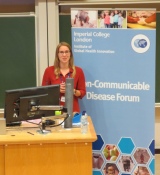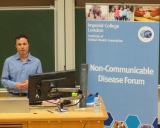Lymphatic Disorders in the Developing World
by Jo Seed

IGHI hosts fourth Non-Communicable Disease Forum.
Imperial’s Institute of Global Health Innovation (IGHI) welcomed staff and students to South Kensington last week for their fourth Non-Communicable Disease (NCD) Forum.
This month’s forum highlighted Imperial’s on-going multidisciplinary work studying the lymphatic system and offered further insight into the neglected tropical disease podoconiosis , a form of non-filarial elephantiasis (leg swelling) mainly occurring in highland areas of tropical Africa, Central America and north-west India. Although preventable and reversible, approximately 1 million people are affected by Podoconiosis in Ethiopia, whilst in Cameroon, a further 500,000 are estimated to be affected according to WHO statistics.
 During the event, Dr Jennifer Le Blond from Imperial’s Department of Earth Science & Engineering outlined the findings of a current joint study with Brighton and Sussex Medical School, the Natural History Museum and the University of Cambridge, looking into potential causes of this disease. Although the precise mechanism of disease development is not fully understood, previous research has identified contact with volcanic soils to be responsible for disease development. The joint study is trying to decipher and understand the irritant in these soils which is causing this disease.
During the event, Dr Jennifer Le Blond from Imperial’s Department of Earth Science & Engineering outlined the findings of a current joint study with Brighton and Sussex Medical School, the Natural History Museum and the University of Cambridge, looking into potential causes of this disease. Although the precise mechanism of disease development is not fully understood, previous research has identified contact with volcanic soils to be responsible for disease development. The joint study is trying to decipher and understand the irritant in these soils which is causing this disease.
The reason for the disease prevalence in these countries is thought to be mainly down to cultural tradition, which dictates people connect with nature and walk around barefoot rather than wearing shoes. Without the correct protective footwear, it is easy to come into contact with these volcanic soils and thus contract the disease, hence it is important to try to instigate behaviour change in these countries to try to get more people to wear shoes. However, as with any embedded tradition, it is very hard to break and thus, the ongoing cycle of disease continues.
 The forum also heard from John Wilson from the Department of Bioengineering and Dr Angela Goode from the Department of Materials, who presented the findings of their research into the functioning and structure of the lymphatic system
The forum also heard from John Wilson from the Department of Bioengineering and Dr Angela Goode from the Department of Materials, who presented the findings of their research into the functioning and structure of the lymphatic system using cutting edge technologies. John presented on behalf of Prof James Moore, and outlined their work on their experimental and computational approaches to better understanding the flow dynamics within the lymphatic system. Dr Goode presented her research imaging sections of the lymph node at nanometre resolution and in 3 dimensions, which can be used to investigate a number of transport phenomena and cell signalling pathways.
using cutting edge technologies. John presented on behalf of Prof James Moore, and outlined their work on their experimental and computational approaches to better understanding the flow dynamics within the lymphatic system. Dr Goode presented her research imaging sections of the lymph node at nanometre resolution and in 3 dimensions, which can be used to investigate a number of transport phenomena and cell signalling pathways.
At the end of the event, John Wilson and Dr Goode joined Dr Le Blond in a Q & A panel discussion.
Photos of the event can be found on our Flickr pages here.
Get involved
Sign up to receive invites to our future forums here.
If you are interested in hosting a future forum and have a specific topic in mind, please contact IGHI’s Communications and Events Officer, Jo Seed at j.seed@imperial.ac.uk
Article text (excluding photos or graphics) © Imperial College London.
Photos and graphics subject to third party copyright used with permission or © Imperial College London.
Reporter
Jo Seed
Institute of Global Health Innovation